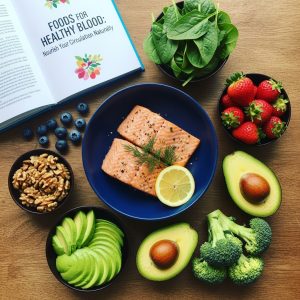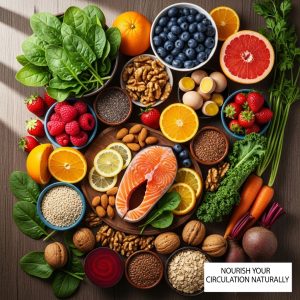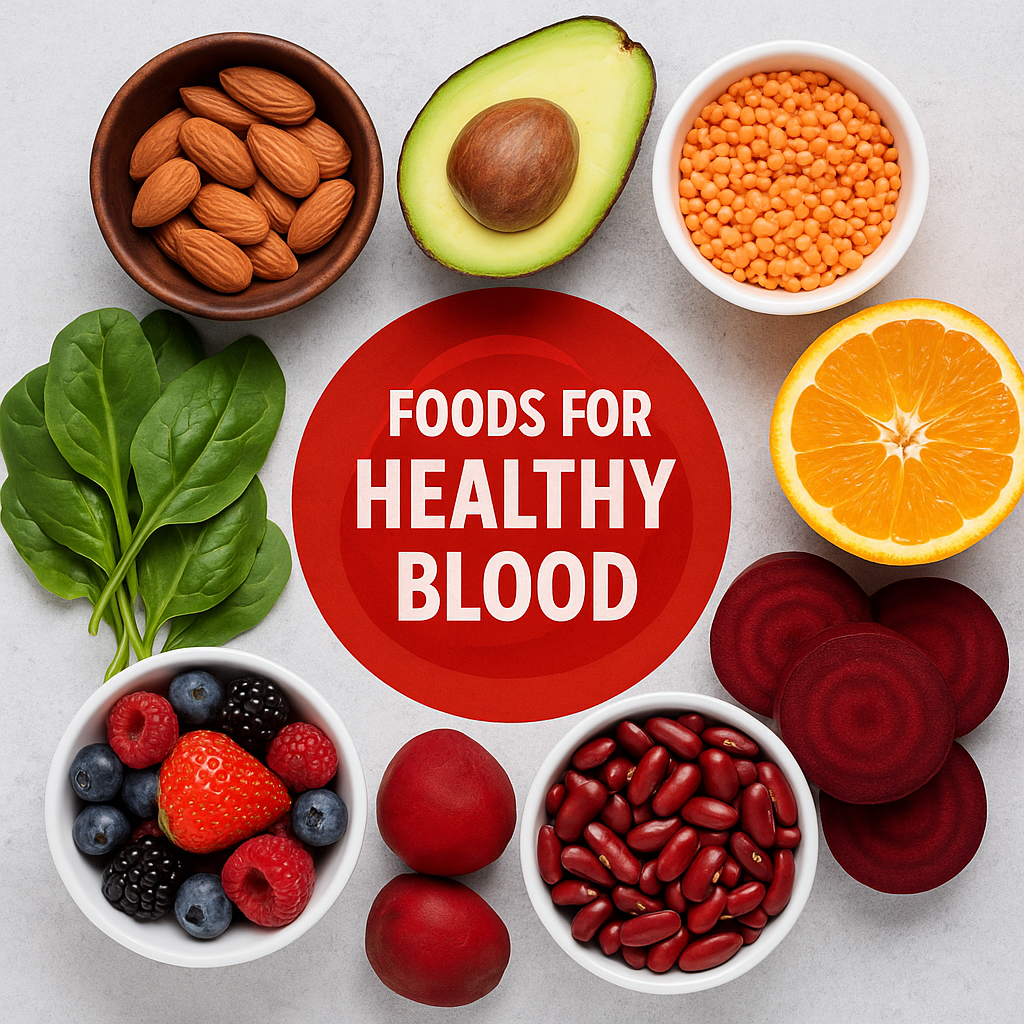Blood is the lifeline of your body — it carries oxygen, nutrients, hormones, and immune cells to every part of you. Keeping your blood healthy ensures good energy, a strong immune system, and efficient circulation. Diet plays a crucial role in maintaining optimal blood quality, preventing anemia, balancing sugar levels, and protecting your heart and vessels.
Let’s explore how certain foods can boost blood health and what nutrients your body needs for strong, clean, and well-functioning blood.

1. Why Blood Health Matters
Your blood does far more than circulate oxygen. It helps:
-
Deliver nutrients and hormones
-
Remove waste and toxins
-
Regulate body temperature
-
Fight infections and repair tissues
When your blood is deficient in certain nutrients (like iron or B vitamins), you may experience fatigue, dizziness, or weakness. Poor diet and lifestyle can also lead to high cholesterol, high sugar, or clotting problems — increasing your risk for heart disease and diabetes.

2. Key Nutrients for Blood Health
a. Iron
Iron is essential for producing hemoglobin, the protein in red blood cells that carries oxygen.
-
Found in: red meat, chicken liver, lentils, spinach, tofu, and pumpkin seeds.
-
Tip: Pair plant-based iron sources with vitamin C-rich foods to boost absorption.
b. Vitamin B12
Vitamin B12 helps form red blood cells and prevents anemia.
-
Found in: eggs, dairy, fish, and fortified cereals.
-
Tip: Vegetarians should include fortified foods or supplements.
c. Folate (Vitamin B9)
Folate supports new cell growth and helps prevent anemia.
-
Found in: leafy greens, avocado, citrus fruits, and beans.
d. Vitamin C
Vitamin C enhances iron absorption and strengthens blood vessels.
-
Found in: oranges, bell peppers, strawberries, and kiwi.
e. Vitamin K
Essential for proper blood clotting and healing.
-
Found in: kale, spinach, broccoli, and Brussels sprouts.
f. Copper
Helps the body use iron and form red blood cells.
-
Found in: shellfish, nuts, seeds, and whole grains.
g. Water
Hydration keeps blood flowing smoothly, supports nutrient transport, and prevents clotting.
3. Best Foods for Healthy Blood
1. Leafy Greens
Spinach, kale, and Swiss chard are packed with iron, folate, and vitamin K — nutrients vital for oxygen transport and blood clotting.
2. Citrus Fruits
Oranges, lemons, and grapefruits contain vitamin C, which boosts iron absorption and strengthens capillary walls.
3. Red Meat and Fish
Beef, chicken liver, and salmon provide heme iron (easily absorbed by the body) and vitamin B12, both crucial for red blood cell production.
4. Legumes
Beans, lentils, and chickpeas are rich in non-heme iron and folate, making them ideal for vegetarians and vegans.
5. Beets
Beets support natural blood detoxification and improve circulation by increasing nitric oxide levels.
6. Berries
Blueberries, blackberries, and strawberries are loaded with antioxidants that protect blood vessels from damage.
7. Nuts and Seeds
Almonds, sunflower seeds, and flaxseeds provide vitamin E and healthy fats that maintain blood vessel flexibility.
4. Foods to Limit for Better Blood Health
Avoid or minimize foods that impair blood function:
-
Processed foods high in trans fats
-
Excess salt (can raise blood pressure)
-
Refined sugar and sodas (can damage blood vessels)
-
Alcohol (interferes with nutrient absorption)
5. Daily Habits to Support Blood Circulation
-
Stay active: Exercise boosts circulation and oxygen flow.
-
Hydrate: Drink at least 6–8 glasses of water daily.
-
Avoid smoking: Nicotine thickens the blood and damages vessels.
-
Eat balanced meals: Include iron, vitamins, and antioxidants daily.
-
Get regular checkups: Monitor iron levels, cholesterol, and blood pressure.
6. The Bottom Line
Your blood reflects what you eat. By focusing on iron-rich foods, B vitamins, antioxidants, and plenty of water, you can build strong red blood cells and maintain smooth, clean circulation. A balanced diet keeps your blood oxygen-rich — fueling your body with the vitality it needs to thrive.
